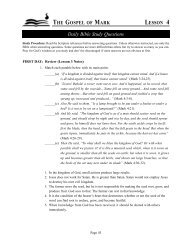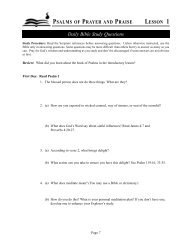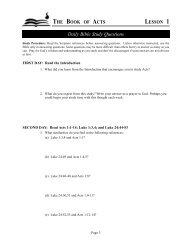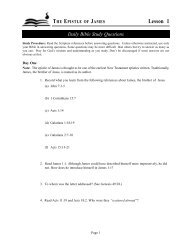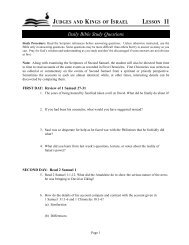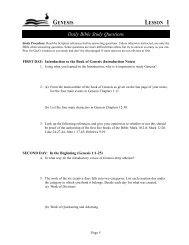Prophets Of Israel Bk 1 rev 5-05.qxp - Explorer's Bible Study
Prophets Of Israel Bk 1 rev 5-05.qxp - Explorer's Bible Study
Prophets Of Israel Bk 1 rev 5-05.qxp - Explorer's Bible Study
Create successful ePaper yourself
Turn your PDF publications into a flip-book with our unique Google optimized e-Paper software.
LESSON 3<br />
PROPHETS OF ISRAEL<br />
had come into conformity with His standard. <strong>Of</strong><br />
course, the idolatrous places of the day would be<br />
condemned and idol-shrines doomed to destruction.<br />
Interrupted by Amaziah (Amos 7:10-17)<br />
This is the only historical and personal<br />
interlude in the prophecies of Amos. Foolishly<br />
Amaziah, the priest of Bethel, tried to stop the efforts<br />
of Amos by reporting him to King Jeroboam II.<br />
Inaccurately, according to the record of Amos’<br />
prophecies we have, Amaziah claimed Amos had<br />
prophesied the death of Jeroboam by sword. This<br />
did not occur (2 Kings 14:28,29), so was obviously<br />
not spoken by Amos because God’s true prophets<br />
were always absolutely accurate (Deuteronomy<br />
18:21,22). The direct quote from the prophecy of<br />
Amos was “I will rise with the sword against the<br />
house of Jeroboam” (Amos 7:9). The prophecy was<br />
general, not personal.<br />
Still today, those who oppose God’s word or<br />
work often twist or change Scripture to incite others<br />
to react. Throughout the ages, religious leaders have<br />
been guilty of such interference with the true work<br />
of God. Jesus pronounced a woe on the leaders of<br />
His day for this: “But woe to you, scribes and<br />
Pharisees, hypocrites! For you shut up the kingdom<br />
of heaven against men; for you neither go in<br />
yourselves, nor do you allow those who are entering<br />
to go in” (Matthew 23:13).<br />
Using another tactic still common today when<br />
an unpopular message is being given, Amaziah<br />
attacked Amos personally, attempting to discredit<br />
his authority and his right to speak for God. It was<br />
true that Amos was not from a recognized school or<br />
family of prophets. He was a “sheepbreeder and a<br />
tender of sycamore fruit” when God called him out<br />
and entrusted him with these messages to <strong>Israel</strong>.<br />
Amos had obediently responded to God’s call.<br />
to be found opposing God or disparaging His<br />
messengers!<br />
Fourth Vision: Ripened Fruit<br />
(Amos 8:1-3)<br />
The Lord showed Amos a bowl of ripe summer<br />
fruit. Like <strong>Israel</strong> at the height of her present<br />
prosperity, nothing could be more appealing.<br />
However, the ripeness would very soon give away<br />
to a rottenness that would require disposal. God said<br />
that the end was coming and that He would not<br />
return to rescue <strong>Israel</strong> again. The worship songs of<br />
which they were so proud would soon be turned to<br />
howlings over the dead bodies that would fall<br />
permanently silent. The nearer judgment to which<br />
this refers was the captivity of <strong>Israel</strong> by Assyria.<br />
The judgments of the “day of the LORD” would<br />
come also but not until the distant future.<br />
Another Sermon (Amos 8:4-10)<br />
In another effort to awaken his listeners to their<br />
need for repentance, Amos began to catalog more of<br />
their sins. Even though they superficially observed<br />
some of God’s laws, like those for keeping Sabbath<br />
or observing the new moons, they were actually<br />
anxious to get the observances over so that they<br />
could continue in their dishonest trade practices.<br />
They used inaccurate scales to give less of their<br />
goods while demanding more from their customers<br />
in payment. They overcharged the needy and then<br />
added the sweepings from the ground to increase the<br />
appearance of the volume of wheat sold to them.<br />
God Himself was watching and remembering<br />
every dishonest act, and He called on earth and<br />
heaven to react against such wickedness (Amos<br />
8:8,9). God would not allow the crooked merchants<br />
of <strong>Israel</strong> to benefit long from their dishonesty<br />
against the poor. He would soon turn their times of<br />
celebration into bitter days of mourning (verse 10).<br />
As punishment for his efforts to keep the<br />
Lord’s warnings from <strong>Israel</strong>, Amaziah and his<br />
family would have some terrible experiences:<br />
“Therefore thus says the LORD: ‘Your wife shall<br />
be a harlot in the city; your sons and daughters<br />
shall fall by the sword; your land shall be divided<br />
by survey line; you shall die in a defiled land; and<br />
<strong>Israel</strong> shall surely be led away captive from his<br />
own land’” (Amos 7:17). It is certainly dangerous<br />
Page 30<br />
A Different Kind of Famine<br />
(Amos 8:11-14)<br />
The written word of God is a gift we too often<br />
underestimate. How could we know God if He had<br />
not left us this <strong>rev</strong>elation of Himself? The Scriptures<br />
are our guide to knowing Him, pleasing him, and<br />
knowing what He has promised us. Yet in keeping<br />
with the modern axiom “use it or lose it,” the



